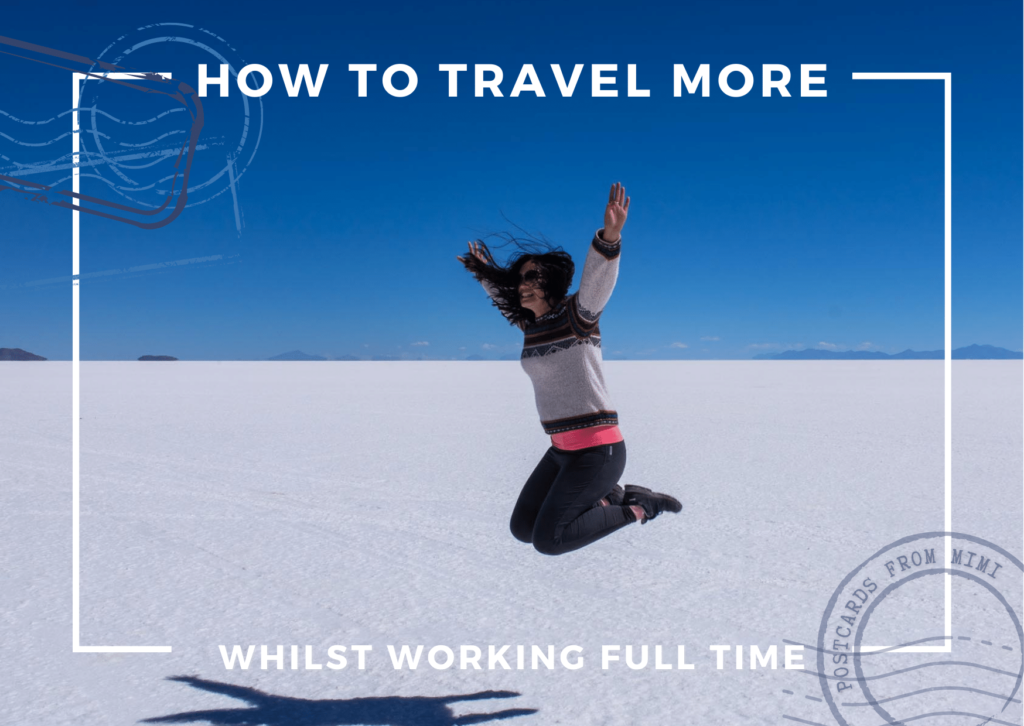So you want to travel and see the world, but you have a full-time job and a limited amount of days off…
There are so many exciting things to see in the world, yet so little time. How can you fit it all in? The answer is not necessarily “become a digital nomad”. For many of us, that’s not a viable, or even desired, option. If you’ve ever felt constrained by your annual leave allowance, you’re not alone.
I am a doctor in the UK, and I’ve been attempting to balance travel with my busy full-time job for years. As a surgical registrar (surgical resident), my work schedule is quite demanding. I have therefore had to be creative to make my travels possible.
Here are my tips on how you can maximise travel whilst working full-time.

1. Planning Ahead
OK this first one sounds obvious, but it’s the most important one to get out of the way. Annual leave is a precious commodity and planning ahead ensures you fully utilise it. Even if you haven’t figured out all the details (or even the location), booking the dates early is important. You can always adjust them later on if needed.
Leaving it too late could make your intended trip prohibitively expensive. It may even mean you’re unable to take the time off due to staffing issues. This sounds ridiculous, but it has genuinely happened to colleagues of mine before. If you don’t take all your annual leave, and you can’t roll it over, you’re essentially working for free!
Make sure to keep track of your annual leave allowance yourself, as HR won’t remind you. Some employers also allow you to accrue more leave over time in your job (junior doctors click here).
2. Take Advantage of Bank Holidays
We get 8 bank holidays (public holidays) per year in the UK. That means 8 extra days of holiday on top of your annual leave allowance – hurray!
You can have 4 days off during a bank holiday weekend by using only one annual leave day. It’s the perfect amount of time for a city break in Europe. The downside is that travel will be more expensive during this time. But you may be able to mitigate this if you book ahead.
If you work in a profession, such as healthcare, that doesn’t respect bank holidays, you might get a day in lieu to use at another time. This is arguably even better than having the bank holiday itself because you get to choose the date to have off. Although tell me this when I’m working Christmas or New Year’s Day, and I may be less convinced…
3. Perfect the Art of the ‘Long Weekend’
In a similar vein to the bank holiday weekend, if you take the Friday and Monday off either side of a free weekend, you’ll get a nice 4-day trip. Long weekends usually work best if you stick to one location – ideal for a city break in Europe.
A 3-day weekend is also an option to stretch your leave allowance further. However you’ll see a destination much more comfortably in 4 days. Having two transit-free days rather than one really makes a difference. Sunday flights are often ridiculously early in the morning, meaning you barely get time to enjoy breakfast before you have to leave. Flights are also generally cheaper on Mondays compared to Sundays.
Flying out earlier on your day of departure and taking a later flight back maximises your time away. If you can predictably finish work on time (not for everyone), it might be worth flying out on Thursday night instead of Friday morning. This gives you a little bit of extra time in your destination. But be realistic about whether you can make it to the airport on time if you choose this option.
4. Stack Weekends and Off Days
The best way to maximise the length of your trip is to stack weekends together. If you take 5 days of annual leave (Monday-Friday), and include the weekends on either side, you can have a 9-day trip using only 5 days of annual leave. If you take 10 days of leave (2x Mon-Fri), you can have a 16-day trip!
If you work shifts, you might also get ‘zero’ days off afterwards. Combining ‘zero’ days with annual leave also helps to prolong your time off. Just don’t organise anything too strenuous for the beginning of the trip if you’ve just finished an on call or night shift!
Using these tactics will stretch your leave allowance so you can have longer trips and travel more frequently.

5. Combine Work with Travel
If you’re lucky enough to be able to travel with work (for example a conference or a project), why not make a short holiday out of it? Stick around for a few extra days afterwards to explore the city. You’re saving on travel time because you’re already there and it’s a bonus if work is paying for some of the expenses.
For doctors especially, look out for international conferences that you can attend to present your work. Some organisations run courses that are both useful and located in a picturesque city – a double-win. You can usually take study leave to attend these, so it doesn’t count towards your annual leave allowance.
6. Travel Solo
Your best travel buddies won’t always be free on the most convenient dates for you. Maybe they’re also reluctant to visit that far-flung destination that’s top of your bucket list. So why not go solo?
If travelling solo seems too daunting a prospect, there are a few options to ease yourself in. Start small by planning a day trip in your local area to get used to solo travel in a familiar environment. You could also spend a few days by yourself at the beginning or end of a group trip with friends. Joining an organised tour is another option, and an easy way to meet other like-minded solo travellers.
Dining solo was one of the things I found the most intimidating. But once you’ve done it a few times, it becomes normal, and actually quite liberating. Sometimes, you might even be able to jump the queue if they have space for one, but not larger groups. Try going for lunch (less intimidating than dinner) by yourself at a nearby café to start with.
7. Utilise Natural Career Gaps
A career break could be the answer to your travel dreams. However, you may be worried that it will negatively impact your career. Quitting your job to travel is a big move, and not the right one for everyone.
Sometimes there may be a natural point in your career where you can take a career break. For example, I took a year out to travel after my foundation training (internship) rather than climbing the next rung on the ladder straight away. This is a common time for UK doctors to take time out, and doesn’t really affect career progression later on. This obviously takes months (or even years) of careful planning and budgeting/saving.
When changing jobs, you will likely have a transition period where you aren’t working. You might be able to negotiate extra time off by delaying your start date. Another option is asking your employer for unpaid leave. This allows you to travel worry-free with continued job security – the perfect time to take that big bucket list trip without any uncomfortable questions about employment gaps.
8. Work From ‘Home’ in a New Place
If your job allows you to work from home, why not change where ‘home’ is? A city break combined with a working holiday might be the perfect solution for you. Renting an apartment for a few weeks in a new destination could be the perfect change of scene for you. Spending longer in a destination will also allow you to see more of a local’s perspective, rather than only hitting the tourist highlights.
Just make sure you have good internet connection and a suitable office space in your intended accommodation. Co-working spaces and coffee shops are alternative options. Some organisations (especially law firms and banks) have offices abroad, where you can temporarily work from.

9. Remember to Rest
And finally, just because you can doesn’t mean you should travel all the time. Listen to your body and remember to rest and recharge as well. If you’re always on the go and never stopping, sooner or later you will exhaust yourself. I’ve definitely suffered burnout from working too much and not having enough actual rest on my days off.
Building in chill days during the trip will help you to both recharge and appreciate the destination more. For longer trips, especially in different time zones, you should plan one or two rest days at home afterwards. Having time to do post-trip laundry and groceries is seriously underrated.
Remember that your work and travel lifestyle needs to be sustainable in the long term. Sometimes you just need to switch off and do nothing, and that’s ok.
I hope you found this useful. Let me know your thoughts in the comments. Happy travelling!
ENJOYED READING? PIN THIS POST!





Such good tips, especially 9!